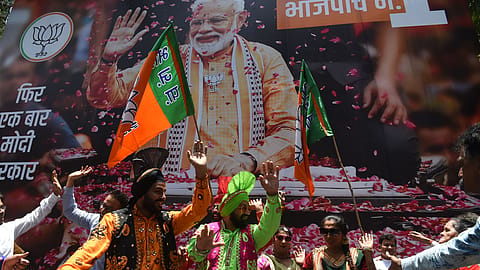India Inc. gets ready for Modi 2.0
With the NDA set for a second term, corporate India says political risk has reduced and market expectation for policy continuity has been addressed.

India has decided. According to the latest figures released by the Election Commission on Thursday, the National Democratic Alliance led by Prime Minister Narendra Modi is leading in 342 of 542 seats and is all set to return for its second five-year term—popularly being referred to as Modi 2.0.
In the last Lok Sabha elections held in 2014, the NDA had won 336 making it the first time after 30 years where a single party won a majority. Following an even cleaner sweep this time, the markets and India Inc. responded positively to the development.
During the early hours of counting, Sensex saw a 1,000-point rally and breached the 40,000 mark for the first time, while Nifty crossed 12,000 points marking a new high for the index. With the NDA set for a second term, corporate India says political risk has reduced and market expectation for policy continuity has been addressed.
“It’s a victory for nationalism and Indian pride. Now no one can stop India from becoming a military and economic superpower. The results are a clear indication that the country and its people are all for progress and stability. Three cheers to the Indian voters” said Puneet Dalmia, managing director, Dalmia Bharat Group.
Mahindra Group chairman Anand Mahindra tweeted: “As I watch the counting, I get the unmistakeable feeling that a turning point in history is unfolding before my eyes. 2 new power blocs are overthrowing the establishment. Not talking about political parties but Women & Young, new voters. Increasingly, they will shape India’s future.”
Recommended Stories
Veteran industrialist and Godrej Group chairman Adi Godrej said that the new government is expected to take steps to ensure that India’s gross domestic product (GDP) growth improves. “The victory of the NDA in the elections will be very good for the Indian economy. I expect the government to take strong action for the revival of GDP growth as soon as it is sworn in. Revival of GDP growth will lead to solution of other problems such as low number of jobs, low agricultural growth, etc. Overall, I see India doing very well over the next five years.”
However, the Modi government’s second term in office is likely to be more challenging than the first, according to Garima Kapoor, economist, Elara Capital. Reeling from consumption slowdown and liquidity crisis in the NBFC sector and lower terms of trade in the agriculture sector, optimism around India’s economic growth has come to a grinding halt, she says. “Unlike the first five years, the solution to the problems is complex and requires a radical shift in the economic policy. If the first five years of the government were dominated by housing, roads and toilets, the next five would have to be dominated by investment, jobs and nursing of the dislocated financial sector,” Kapoor says.
(INR CR)
The real estate sector expects the new government to further aid the growth of the industry with better initiatives. Surendra Hiranandani, founder and managing director, House of Hiranandani, says the new government should push investments and growth and take measures to generate employment. He says the new government can do away with unnecessary documentation. “It is important that single window clearance is soon put into practice which will not only resolve operational issues prevalent in the industry, but would improve the productivity of the real estate industry,” he says.
Fintech services, too, is banking on the new government’s policies to ensure that single-window clearance can help the regulatory framework simpler. They expect a push towards more convenience, cost effectiveness and adoption of technology. “It is our belief that the (new) government will take steps to further strengthen the fintech ecosystem in India. With the consumer in mind, the government should introduce regulations that are flexible in nature and benefit multiple stakeholders,” Navtej Singh, CEO, digital business, Hitachi Payment Services, said.
Himanshu Pujara, managing director, Euronet Services, said that a right mix of policies, regulation and incentives are required to further the fintech space. “Going forward the government has to ensure that policy and regulation have a coordinated run with industry requirements and innovation to foster creativity, new investments and secure growth of the sector,” he said.
BSE member Ramesh Damani said that he expects more foreign fund inflow into India going ahead. “A lot of the deals that were stuck in the past six months because of the elections, are more likely to happen now, so that itself will attract a lot of FDI (foreign direct investment). So I think there will be some buoyancy in terms of foreign flow into India, given how this election has panned out,” Damani said.